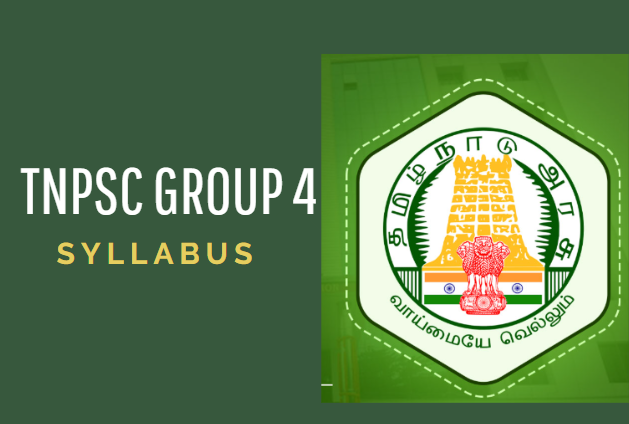The Revised Scheme and Syllabus of TNPSC Group-IV and VAO Examination

The Tamil Nadu Public Service Commission (TNPSC) recently introduced a revised scheme and syllabus for the Combined Civil Services Examination-IV (Group-IV and VAO). This new structure, effective from 2022, aims to streamline the examination process, enhance its focus, and provide aspirants with clear…
Table of Contents
The Revised Scheme and Syllabus of TNPSC Group-IV and VAO Examination
The Tamil Nadu Public Service Commission (TNPSC) recently introduced a revised scheme and syllabus for the Combined Civil Services Examination-IV (Group-IV and VAO). This new structure, effective from 2022, aims to streamline the examination process, enhance its focus, and provide aspirants with clear guidelines for preparation. Here’s an in-depth breakdown of the scheme, syllabus, and strategies to excel.
Scheme of Examination
The examination is divided into a single paper of objective type, consisting of two parts:
Part-A: Tamil Eligibility-cum-Scoring Test
- Standard: SSLC (10th-grade level)
- Questions: 100 questions worth 150 marks
- Minimum Qualifying Marks: 40% (60 marks)
Part-B: General Studies & Aptitude
- Standard: SSLC level
- General Studies: 75 questions
- Aptitude & Mental Ability Test: 25 questions
- Total Marks: 150 marks
The total duration of the exam is 3 hours with a combined total of 300 marks. It is important to note that Part-B will be evaluated only if the candidate secures the minimum qualifying marks in Part-A.
Detailed Syllabus
Part-A: Tamil Eligibility Test
This section assesses proficiency in Tamil, focusing on:
- Grammar and sentence structure, including error identification and correction.
- Proficiency in Tamil literature, emphasizing Thirukkural, ancient texts, and cultural heritage.
- Comprehension skills, such as deriving logical conclusions from passages.
- Knowledge of Tamil authors, poets, and literary contributions.
Part-B: General Studies and Aptitude
The focus is on conceptual clarity and problem-solving skills across various domains:
General Science:
- Nature of the universe, basic mechanics, electricity, and magnetism.
- Chemistry fundamentals like acids, bases, salts, and food adulterants.
- Biology, including nutrition, health, genetics, and human diseases.
- Environmental science topics.
Current Events:
- Profiles of states, national symbols, and eminent personalities.
- Latest scientific inventions, socio-economic issues, and government welfare schemes.
Geography:
- Physical and cultural geography of India and Tamil Nadu.
- Topics like monsoons, water resources, population density, and climate change.
History and Culture of India:
- Indus Valley Civilization to the Mughal period and Marathas.
- India’s cultural diversity, secularism, and historical unity.
Indian Polity:
- Constitution of India, fundamental rights, and duties.
- Structure of union and state governments, federalism, judiciary, and election systems.
Indian Economy:
- Five-year plans, GST, and resource sharing.
- Rural welfare programs, industrial growth, and socio-economic challenges.
Indian National Movement:
- Early uprisings and the roles of leaders like Mahatma Gandhi, Subhash Chandra Bose, and others.
- Tamil Nadu’s contributions to the freedom struggle.
History, Culture, Heritage, and Socio-Political Movements in Tamil Nadu:
- Contributions of Sangam literature, Thirukkural, and reform movements.
- Women’s role in freedom movements and significant social reformers.
Development Administration in Tamil Nadu:
- Social justice, education, and health systems in Tamil Nadu.
- The role of geography in economic growth.
Aptitude and Mental Ability:
- Questions on percentages, ratios, time and work, logical reasoning, and number series.
Preparation Tips
- Focus on Fundamentals: Emphasize SSLC-level textbooks for General Studies and Tamil grammar.
- Practice Mock Tests: Regular practice under timed conditions to improve speed and accuracy.
- Stay Updated: Read daily newspapers and follow credible news sources for current events.
- Master the Tamil Language: Focus on literary works, authors, and grammar from the syllabus.
- Use Reliable Resources: Refer to TNPSC-recommended books and guides for systematic preparation.
Significance of the Revised Scheme
The introduction of the mandatory Tamil Eligibility Test underlines the importance of Tamil as the administrative language of the state. The revised syllabus ensures that candidates possess the requisite knowledge to perform their duties effectively while promoting Tamil Nadu’s cultural heritage.
This revamped examination structure not only tests intellectual abilities but also evaluates the cultural and linguistic awareness of the aspirants. The balanced approach to General Studies and Aptitude ensures comprehensive assessment, paving the way for the selection of well-rounded candidates.
Prepare diligently and focus on conceptual clarity, as this revised syllabus requires thorough understanding and methodical practice.
